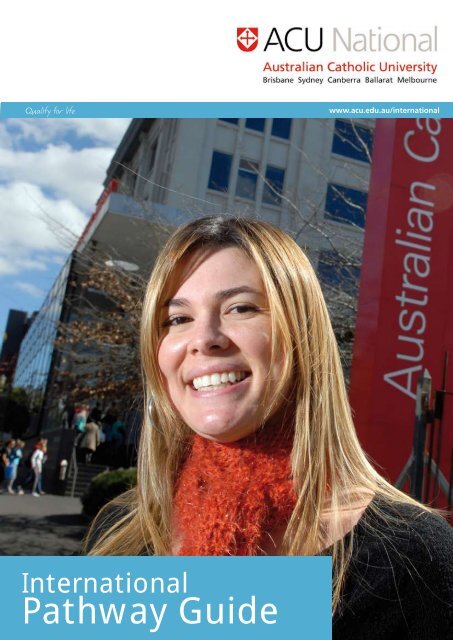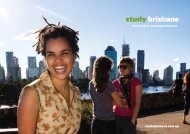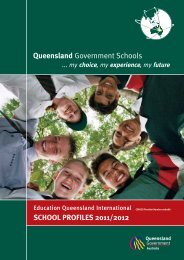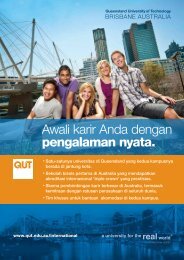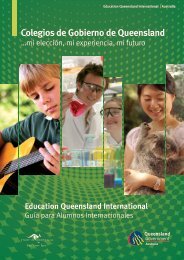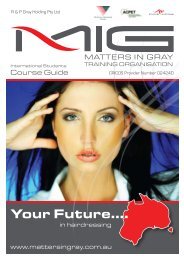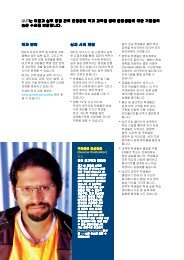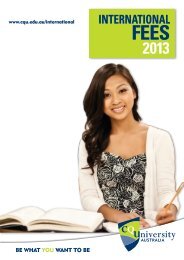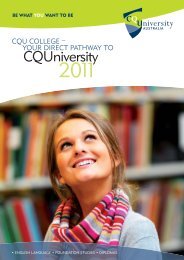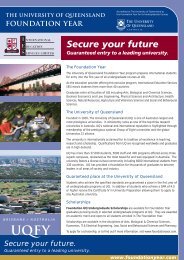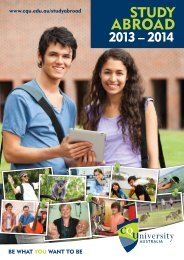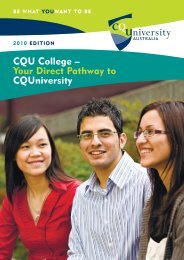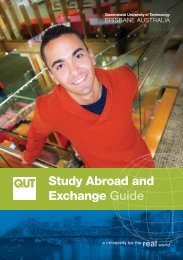Pathway Guide
Pathway Guide - Study Brisbane
Pathway Guide - Study Brisbane
- No tags were found...
Create successful ePaper yourself
Turn your PDF publications into a flip-book with our unique Google optimized e-Paper software.
Qualify for life<br />
www.acu.edu.au/international<br />
International<br />
<strong>Pathway</strong> <strong>Guide</strong>
WELCOME<br />
About Us<br />
Our Services<br />
Our Campuses<br />
Our Students<br />
Living in Australia<br />
Our Courses<br />
English Language Programs<br />
1<br />
3<br />
4<br />
7<br />
8<br />
10<br />
Preparing for study in Australia can<br />
be an overwhelming task.<br />
Australian Catholic University (ACU National)<br />
recognises the challenges of adjusting to a new<br />
education system, and, in most cases, a new language.<br />
That’s why we offer a range of easy to understand<br />
pathway programs for international students<br />
who are trying to enter into university study.<br />
Our pathway programs include English Language<br />
Programs and Diplomas. They aim to help<br />
you reach your further study goals. And they<br />
are taught on-campus, so you can gain the<br />
experience of student life all while making<br />
progress towards a higher education program!<br />
The ACU National community is founded on an<br />
ethos of justice and equity. We endeavour to provide<br />
excellent higher education to a diversified and<br />
dispersed student body and to ensure that all students<br />
receive the care and assistance needed to achieve this.<br />
It is with great pleasure that I invite you to join us<br />
to begin a pathway towards university study.<br />
Our Courses<br />
Diploma <strong>Pathway</strong> Programs<br />
14<br />
How to Apply<br />
25<br />
Prof Greg Craven<br />
Vice-Chancellor<br />
Valerie Hoogstad<br />
Director, International Education<br />
information in this publication is correct as at june<br />
2008, but is subject to change. the university reserves<br />
the right to amend, cancel or otherwise modify without<br />
notice, the content of any matter in this publication,<br />
and may withdraw any course offered therein, or<br />
impose limitations on enrolment in any course.<br />
produced by elissa newall.
ABOUT US<br />
Australian Catholic University (ACU National)<br />
is a public university which commenced<br />
operations in 1991 following the amalgamation<br />
of four Catholic tertiary institutions with<br />
history dating back to the mid-1800’s.<br />
As an Australian Government-funded institution, we<br />
are open to students and staff of all beliefs, nationalities<br />
and cultures. Our strong spiritual foundations foster<br />
an environment of tolerance and inclusion.<br />
We host more than 15,800 students, including<br />
3,000 international students, and are renowned<br />
for the supportive environment we provide.<br />
Our campuses are welcoming and modern. Students<br />
enjoy small classes and personalised learning, and<br />
have easy access to lecturers, staff and facilities.<br />
Our awards are internationally recognised and there is a<br />
broad perspective in our research, teaching and learning.<br />
The University is a member of the Association of<br />
Commonwealth Universities and the International<br />
Federation of Catholic Universities. The University’s<br />
Vice-Chancellor is a member of Universities Australia.<br />
The University conducts its activities in accordance<br />
with the Education Services for Overseas Students<br />
Act (ESOS) 2000: http://aei.dest.gov.au/sectors/<br />
international_education/default.htm<br />
Australian Catholic University and the courses offered by the<br />
University are registered on the Commonwealth Register of<br />
Institutions and Courses of Overseas Students (CRICOS).<br />
Provider registration codes:<br />
00004G, 00112C, 00873F, 00885B.<br />
www.acu.edu.au/international
We are a public university<br />
We are funded by the Australian Government<br />
and our awards are recognised by the<br />
Australian Qualifications Framework.<br />
A choice of campuses<br />
We have six campuses across Australia, including:<br />
Brisbane, Sydney (2), Canberra, Ballarat and Melbourne<br />
High quality programs<br />
ACU National is a leader in the fields of education, nursing<br />
and exercise science but we also offer excellent degree<br />
programs in accounting, business, information systems,<br />
social science, environmental science and visual arts.<br />
Academic Information<br />
Semester Timetable<br />
Semester One<br />
Commences 1st week in February<br />
Finishes 3rd week in June<br />
Semester Two<br />
Commences 2nd week in July<br />
Finishes 2nd week in November<br />
This information is a guide only.<br />
Students who do not arrive in time for the commencement<br />
of semester will miss essential orientation information.<br />
Assessment Methods<br />
Assessments may include use of a range of methods<br />
such as formal end of semester examinations, continuous<br />
assessment through the semester, written assignments/<br />
essays, field projects etc. Students will be advised of the<br />
particular method(s) at commencement of the course.<br />
Academic Progress<br />
A student’s enrolment in a course may be deferred,<br />
suspended or cancelled in accordance with University<br />
regulations. These regulations are listed in the yearly<br />
handbook, accessible via: http://my.acu.edu.au/39999<br />
Access to highly qualified staff<br />
Over 85% of our academics hold a<br />
PhD or Masters qualification.<br />
Affordable tuition fees<br />
Our tuition fees have remained low over many years and<br />
we remain an attractive option for international students<br />
Five Stars for Graduates<br />
We offer courses that are important to our society.<br />
The Good Universities <strong>Guide</strong> 2008 awarded<br />
ACU National with the top rating for positive<br />
graduate outcomes and graduate salaries.<br />
Practical experience<br />
We ensure that all of our undergraduates receive<br />
professional experience prior to course completion.<br />
A diverse student population<br />
With international students from over 80 different<br />
countries, it is clear that we are open to all.<br />
Flexible pathways<br />
We offer international students a variety of entry<br />
pathways to University study. Options include English<br />
Language and Diploma programs held on-campus.<br />
A community environment<br />
Each campus is friendly and personal. Dedicated<br />
staff and a range of support services are committed<br />
to looking after students’ wellbeing.<br />
<br />
www.acu.edu.au/international
OUR sERVICEs<br />
All international students have access to the<br />
general services and facilities available to Australian<br />
students. There are also special services tailored<br />
to meet the needs of international students.<br />
Travelling to a foreign country to study can be a challenge.<br />
At ACU National we aim to maximise your learning and<br />
development opportunities and eliminate stress and anxiety.<br />
From extensive experience we have developed a number<br />
of academic and social support services to ensure that you<br />
are in the best position to achieve your educational goals.<br />
Academic Skills Support<br />
Each campus has an Academic Skills Unit with advisers who<br />
can help you to study successfully at university. They will help<br />
you to develop learning, writing and language strategies.<br />
Career Development and<br />
Employment Service<br />
Careers Advisers are available on each campus of<br />
ACU National to assist students with making career<br />
decisions, identifying personal career goals, developing<br />
employability skills, searching for employment<br />
and preparing employment applications.<br />
Computers and the Internet<br />
Student computer facilities are available on campus.<br />
They include access to internet, email, and scanner<br />
facilities. A range of software for both classroom<br />
and professional purposes is also provided.<br />
Counsellors<br />
Qualified counsellors are available at each campus to<br />
offer free, confidential advice. The counselling service<br />
provides practical advice on study, finance and university<br />
procedures. Where necessary, they can also help with stress<br />
management, grief, depression and relationship difficulties.<br />
Disability Services<br />
Each campus has a Disability Adviser who assists students<br />
who have educational needs arising from a disability or<br />
long term medical condition. This service is free. Students<br />
are encouraged to contact the Disability Advisor as soon as<br />
possible, preferably before arrival in Australia, as it can take<br />
time to arrange any necessary educational adjustments.<br />
International Orientation<br />
International students receive a comprehensive orientation<br />
program to familiarise them with university procedures,<br />
Australian study methods and social customs and<br />
culture. Campus tours and “welcome events” are<br />
also part of the international student induction.<br />
International Student Advisers<br />
Our philosophy of pastoral care ensures students<br />
feel confident and secure in Australia. International<br />
Student Advisers provide advice on enrolment,<br />
assistance with visas, accommodation and finance.<br />
Library<br />
The campus libraries provide access to information<br />
housed on campus and in other locations through such<br />
facilities as CD-ROMs, databases, on-line searching<br />
and Telnet services. Various reciprocal arrangements<br />
have also been made with libraries in other universities,<br />
which extend the resources available to students.<br />
Mission Engagement<br />
Each campus has a team to develop the<br />
University’s Mission. This can include:<br />
»<br />
»<br />
»<br />
»<br />
»<br />
»<br />
Student<br />
Comment<br />
“I chose ACU National<br />
because they have English<br />
programs as well as tertiary<br />
education programs. There<br />
are more open learning<br />
opportunities for everybody.”<br />
Saya Ike<br />
Japan<br />
Opportunities for prayer, reflection and retreats<br />
Leadership formation<br />
‘Exploring the Mission of ACU National’ workshops<br />
Pastoral care<br />
Opportunities to be involved in social<br />
justice and community engagement<br />
A weekly Eucharist celebration<br />
Student Associations<br />
The Student Associations on each campus<br />
promote the welfare of students and encourage<br />
broad participation in university life.<br />
www.acu.edu.au/international
OUR CAMPUsEs<br />
Brisbane<br />
Brisbane Campus<br />
(McAuley at Banyo)<br />
1100 Nudgee Road<br />
Banyo QLD 4014<br />
Situated in the northern suburb of Banyo, this campus is<br />
located just 12 kilometres from the centre of Brisbane.<br />
The campus is on the site of the former Pius XII Provincial<br />
Seminary with a history extending back to 1863.<br />
It is easily accessed by public transport, approximately one<br />
kilometre from Banyo train station, and has a bus stop at<br />
its doorstep. The campus provides quality teaching and<br />
office space, including a state-of-the-art library, science<br />
labs, nursing labs, computer facilities, music rooms, drama<br />
teaching room, a bookshop, cafeteria, coffee shop, library,<br />
computer labs, a swimming pool and sporting grounds.<br />
Student Population<br />
2715 students (total)<br />
350 international students<br />
Living in Brisbane<br />
Brisbane is the capital city<br />
in the state of Queensland,<br />
as well as the third largest<br />
city in Australia. It is set<br />
close to the Pacific Ocean<br />
and with a population of<br />
1.25 million it offers all the<br />
conveniences of a large city.<br />
Brisbane has a humid<br />
subtropical climate with<br />
hot summers and dry, mild<br />
winters. It is a handy base<br />
for touring the famous Gold<br />
and Sunshine coasts and<br />
Australia’s Great Barrier Reef.<br />
<br />
www.acu.edu.au/international
Sydney<br />
North Sydney Campus<br />
(Mackillop)<br />
40 Edward Street<br />
North Sydney NSW 2060<br />
Just a five-minute train ride over the famous Sydney<br />
Harbour Bridge from the city centre, the campus is<br />
conveniently located in the North Sydney business precinct.<br />
North Sydney campus life is centred around a large<br />
outdoor courtyard and student recreational area<br />
where students congregate between classes.<br />
The campus is small, multicultural, and friendly and is<br />
accessible by an excellent bus service. The Vice Chancellery<br />
of the University is co-located on this campus.<br />
Student Population<br />
3050 students (total)<br />
1670 international students<br />
Living in Sydney<br />
Sydney has a population of<br />
more than 4 million. World<br />
renowned for its beautiful<br />
harbour, Harbour Bridge and<br />
Opera House, Sydney also<br />
has a host of entertainment<br />
and sporting activities.<br />
It is one of the most<br />
multicultural cities in the<br />
world. Its public transport<br />
network combines travel on<br />
trains, buses and ferries and<br />
the climate is comfortable,<br />
with average temperatures<br />
being 23°C in summer,<br />
and 13°C in winter.<br />
www.acu.edu.au/international
Melbourne<br />
Melbourne Campus<br />
(St Patrick’s)<br />
115 Victoria Parade<br />
Fitzroy VIC 3065<br />
The campus is conveniently located on the fringe<br />
of the Melbourne Central Business District (CBD). It<br />
is within a short walk of the popular retail strips of<br />
Brunswick Street and Smith Street with their variety<br />
of cafes, shops and art galleries. Some of Melbourne’s<br />
finest parks, gardens and recreational facilities are<br />
also within easy walking distance of the campus.<br />
The main campus building is a multi-storey complex that has<br />
been completely renovated to provide students and staff<br />
with purpose-built facilities. It is a modern, compact study<br />
environment that bustles with activity throughout the week.<br />
Bus and tram stops are located outside the front entrance<br />
and it is only a short walk to the nearest train station.<br />
Student Population<br />
4625 students (total)<br />
750 international students<br />
Living in Melbourne<br />
Melbourne has, on numerous<br />
occasions, been voted<br />
amongst the world’s most<br />
liveable cities. It is well known<br />
for its numerous parks and<br />
gardens and its cosmopolitan,<br />
outdoor cafe lifestyle.<br />
As well as a major sporting,<br />
commercial and cultural<br />
centre of Australia, Melbourne<br />
is a very multicultural city.<br />
The climate of Melbourne<br />
is moderate with average<br />
temperatures being 27°C in<br />
summer and 14°C in winter.<br />
<br />
www.acu.edu.au/international
OUR sTUDENTs<br />
Josefa Twapita Angola<br />
Diploma in Liberal Studies (2006)<br />
Bachelor of Social Science (2007-2008)<br />
“I made my decision to come and study as an international<br />
student at ACU National in Brisbane because it is a good<br />
and welcoming university. The service is excellent, staff very<br />
friendly, facilities the best. One can start from a Diploma and<br />
go on with further courses. I have enjoyed meeting other<br />
international students from other parts of the world.”<br />
Man Pan Leong Macau<br />
Diploma in Visual Arts & Design (2006)<br />
Bachelor of Business / Bachelor<br />
of Arts (2007 - current)<br />
“ACU National is providing a fantastic educational environment<br />
and offering high educational facilities. My campus in Sydney<br />
is a wonderful and classical building. It is surrounded by a<br />
peaceful and comfortable environment that is different to<br />
other universities. I enjoy studying here because the classmates<br />
are very nice, and the lecturers are so cordial and serious. ”<br />
Nasis Wongsankakorn Thailand<br />
General English (2003)<br />
Diploma in Business (2004)<br />
Bachelor of Business (2005-2006)<br />
“I think ACU National is a good university because when<br />
I studied the English course, the teachers and staff were<br />
friendly. I think that I had good opportunities to learn different<br />
cultures and to meet new people from different countries.”<br />
Jie Li People’s Republic of China<br />
Certificate IV in Nursing (2006)<br />
Bachelor of Nursing (2007 - current)<br />
“ACU National was a great choice for me, because it has<br />
such a good reputation for Nursing around Australia. As well,<br />
it has good teachers and that really stands out for me.<br />
My campus is a fine modern building, situated in the<br />
heart of Melbourne. The library is well equipped with<br />
books, magazines and computers. The most significant<br />
experience for me has been getting used to Australian<br />
educational system as well as the lifestyle and culture.”<br />
www.acu.edu.au/international
LIVING IN AUsTRALIA<br />
Fees and visa information<br />
Australia is a country of stunning contrasts. It is<br />
slightly smaller in size than the United States but<br />
only has a population of 21 million. It contains<br />
arid deserts and lush tropical rainforests. In the<br />
north it faces Asia, in the south Antarctica. The<br />
original inhabitants of the continent were the<br />
sole occupants for almost 50,000 years. In the<br />
last 200 years migrants have come here from all<br />
over the world ensuring that it is now home for<br />
people of more than 200 different nationalities.<br />
The safe environment and comfortable climate<br />
provide many opportunities to enjoy both the<br />
beauty of the countryside and beaches, and the<br />
amenities of the modern cosmopolitan cities.<br />
Student<br />
Comment<br />
“I enjoy studying at ACU<br />
National because there<br />
are multicultural students,<br />
After graduation I want to<br />
continue living in Australia.<br />
It is a very nice place.”<br />
Fees<br />
ACU National tuition fees are comparable with those of<br />
other Australian universities. Students are charged according<br />
the number of units studied each semester. An average study<br />
load is 4 units (40 credit points) per semester.<br />
For unit prices, please refer to:<br />
http://www.acu.edu.au/international/<br />
international_admissions/fee_information/<br />
In addition to tuition cost the tuition fees cover:<br />
»<br />
»<br />
»<br />
Lalita Chayia<br />
Thailand<br />
Orientation program<br />
Access to student services and facilities<br />
Study skills assistance<br />
Tuition fees may increase by up to 3 percent each year for<br />
the minimum duration of the course as provided on your<br />
electronic Confirmation of Enrolment (eCOE). No guarantee<br />
is made for tuition fee increases beyond the minimum<br />
duration. Some courses may also require the purchase<br />
of additional items (eg. uniforms for nursing courses).<br />
Refund Policy<br />
The ACU National Refund Policy and Release Policy are<br />
available from the University website:<br />
http://www.acu.edu.au/international/<br />
international_admissions/fee_information<br />
Visa Information<br />
About Student Visas<br />
Visas generally last for the period of the course, and<br />
are granted on the condition that students must leave<br />
Australia soon after completion of their studies.<br />
The University is required to report any student who does not<br />
attend classes or who is not making satisfactory progress.<br />
International students are required to complete the course<br />
within the minimum duration as provided on the eCOE.<br />
If you wish to stay in Australia for the graduation<br />
ceremony (which takes place early in the year<br />
after completion of a course) you may need to<br />
apply in Australia for a visitor class visa.<br />
Family (dependants)<br />
If you intend to bring family members with you to Australia,<br />
you should first check with your nearest Australian Visa<br />
Office whether your visa allows for this. While you are<br />
in Australia, you will be responsible for supporting any<br />
dependants (ie family members). Tuition fees must be<br />
paid for school age dependants who study in Australia.<br />
Students who obtain Permanent<br />
Resident Visa Status<br />
If you are granted permanent resident status after<br />
commencing a semester as an international student,<br />
that semester of study may be completed but it will be<br />
necessary to reapply for the course as a local student<br />
for subsequent semesters. Although every consideration<br />
will be given, there is no guarantee that you will be<br />
accepted back into the course, as the quotas for<br />
international students and local students are separate.<br />
After becoming a permanent resident you would be liable<br />
to pay the local tuition fees from the date of permanent<br />
residence, unless it is after the relevant semester census<br />
date. In this case you would be liable for local tuition<br />
fees from the subsequent semester onwards.<br />
<br />
www.acu.edu.au/international
Living costs<br />
Living Costs<br />
The cost of living varies from city to city. Students require<br />
a minimum of approximately $A14,000-$A18,000 per year<br />
for living expenses. This covers accommodation, food and<br />
transport, but does not allow for luxuries, entertainment<br />
or a car. In addition, an initial establishment cost is<br />
usually needed to cover rental bonds for accommodation,<br />
furniture, electricity and telephone expenses.<br />
Accommodation<br />
The International Education Office can book Homestay<br />
accommodation for students in pathway programs.<br />
Homestay offers international students the opportunity to<br />
live in a local home while studying in Australia. Homestay is<br />
suitable for stays ranging from a few weeks to many months.<br />
By living with an Australian family you will improve your<br />
English and get a closer understanding of Australian life.<br />
Students should budget approximately AUD$225 - $240<br />
per week for Homestay which includes utilities and most<br />
meals. A placement fee of AUD$187 is also payable<br />
(except in Melbourne). Homestay accommodation and<br />
airport reception services can be booked directly from the<br />
University website: www.acu.edu.au/arrivalbookingform<br />
Clothing<br />
In Australia, clothing can be costly except for<br />
occasional bargains. If coming from a warm climate<br />
to a cooler climate (such as Melbourne) students<br />
should either bring warm clothes or budget additional<br />
funds to purchase them after arrival in Australia.<br />
Entertainment<br />
Most students tend to organise entertainment<br />
among themselves, or take part in on-campus<br />
activities. Other entertainment can be costly.<br />
Travel Concessions<br />
State government travel concessions are available<br />
to international students in Brisbane, but are<br />
not offered in Sydney or Melbourne.<br />
Overseas Students Health Cover (OSHC)<br />
The Australian government requires all international<br />
students and their dependants to obtain health insurance<br />
for the duration of their visas. Course length cover<br />
must be paid with the first semester’s tuition fee.<br />
OSHC covers 85% of the Government-scheduled fees for<br />
private doctors, pathology and x-rays. Students must make<br />
up the shortfall. Please note: OSHC will not cover any preexisting<br />
conditions (ie those which existed within 18 months<br />
before the student began study). The University’s preferred<br />
OSHC provider is Worldcare:<br />
www.oshcworldcare.com.au<br />
Initial Expenses<br />
Item<br />
Cost<br />
Temporary accommodation (2 weeks) $500<br />
Food and transport (1 month) $300<br />
Rent in advance $400<br />
Bond (refundable after leaving) $400<br />
Furniture and kitchenware<br />
(second-hand)<br />
$880<br />
Connection charges (for utilities) $170<br />
Total $2650<br />
All costs are in Australian dollars and can vary greatly.<br />
They are a guide only.<br />
Weekly Expenses<br />
Item Brisbane Sydney Melbourne<br />
Rent<br />
(shared basis)<br />
Food (home<br />
cooking)<br />
Utility Bills<br />
(electricity etc)<br />
Public<br />
Transport<br />
$110 $130 $120<br />
$70 $90 $80<br />
$30 $30 $30<br />
$35 $40 $40<br />
Personal items $50 $50 $50<br />
Total<br />
(Weekly)<br />
$295 $340 $320<br />
Total<br />
(Yearly)<br />
$15 340 $17 680 $16 640<br />
All costs are in Australian dollars and can vary greatly.<br />
They are a guide only.<br />
Employment<br />
International students on a Student Visa are permitted<br />
to work for up to 20 hours per week during semester<br />
time and full-time during vacations (for example over<br />
the three month break of December to February).<br />
Although many international and local students are<br />
successful in obtaining casual and part-time employment,<br />
students should not rely on obtaining such work<br />
when calculating a budget. Support staff at each<br />
campus can provide information on how to seek casual<br />
employment in Australia, but it cannot be guaranteed.<br />
Other<br />
Students should note that legal, medical and dental<br />
services in Australia are quite expensive.<br />
www.acu.edu.au/international
OUR COURsEs<br />
English Language Programs<br />
If you do not meet the English Language<br />
requirement for entry into ACU National, you<br />
can enrol in an English Language Program. By<br />
providing excellent teachers and proven English<br />
Language programs we will give you the skills<br />
and confidence to increase your level of English.<br />
As an English Language student, you will study<br />
on the University campus and will have access<br />
to university facilities and services while you<br />
study with us. You will also receive a certificate<br />
of completion once you finish, so you can be<br />
reminded of your achievement and improvement.<br />
General English<br />
Sample Timetable<br />
(Melbourne)<br />
Location<br />
Sydney (North Sydney)<br />
Melbourne<br />
Duration<br />
4 to 48 weeks<br />
Commencement<br />
Every four weeks with 12 intakes each year<br />
Levels<br />
Elementary to Upper Intermediate<br />
Course Aims<br />
This course aims to enable students to develop fluency,<br />
accuracy and confidence in listening, speaking, reading and<br />
writing in English in everyday situations. It is designed for<br />
students who require English for general communication in<br />
their jobs or social life, or who need to improve their English<br />
language skills before moving on to academic English.<br />
Students in General English will develop:<br />
»<br />
»<br />
»<br />
Confidence in listening, speaking, reading and writing<br />
English through tasks relevant to their interests;<br />
Accuracy in speaking and writing through extending<br />
their knowledge of English grammar and pronunciation;<br />
An understanding of Australian society and<br />
culture through activities in the classroom and off<br />
campus, such as excursions to places of interest.<br />
Monday Tuesday Wednesday Thursday Friday<br />
Session<br />
1<br />
Homework review<br />
Speaking activities<br />
Grammar<br />
presentation and<br />
communicative<br />
practice activities<br />
Homework review<br />
Speaking activities<br />
Reading:<br />
Comprehension<br />
and vocabulary<br />
activities<br />
Homework review<br />
Speaking activities<br />
Writing: Working<br />
on sentence,<br />
paragraph and text<br />
Homework review<br />
Speaking activities<br />
Behind the News:<br />
Current affairs<br />
video listening<br />
and vocabulary<br />
activities.<br />
Homework review<br />
Speaking activities<br />
Weekly review:<br />
Grammar, vocabulary<br />
and writing.<br />
Speaking: Discussion<br />
and further<br />
communicative<br />
practice<br />
Break Break Break Break Break<br />
Session<br />
2<br />
Listening:<br />
Comprehension<br />
and vocabulary<br />
activities<br />
Speaking:<br />
Communication<br />
and pronunciation<br />
activities<br />
Language in<br />
action: Vocabulary<br />
and phrasal verbs<br />
and idioms<br />
Reading and<br />
discussion: Current<br />
affairs newspaper<br />
article - follow up<br />
from session 1<br />
CALL (computeraided<br />
language<br />
learning)<br />
10 www.acu.edu.au/international
IELTS Test Preparation<br />
Admission Requirements<br />
12 week program<br />
An overall IELTS score of no less than 0.5 under the entry<br />
score for the intended study at ACU National<br />
8 week program<br />
An overall IELTS score which meets the entry score for<br />
the intended study at ACU National, with one band<br />
only below the entry score by no less than 0.5.<br />
Course Aims<br />
IELTS Test Preparation aims to prepare students to take<br />
the Academic Module of the IELTS Test or ACU English<br />
Test. It focuses on giving students a clear understanding<br />
of the IELTS Test and the skills and strategies they need<br />
to be successful. The course is organised around a series<br />
of topics that match those commonly found in the IELTS<br />
Test, such as technology, society and the environment.<br />
Students in IELTS Test Preparation will develop:<br />
»<br />
»<br />
»<br />
»<br />
Confidence and fluency to communicate<br />
on a wide variety of topics;<br />
The ability to quickly and accurately explain<br />
information and express opinions;<br />
Listening skills to cope with a range of situations;<br />
The skills needed to quickly read and<br />
comprehend complex articles.<br />
Students successfully completing the 12-week IELTS<br />
Test Preparation program are expected to improve<br />
their overall IELTS level by at least 0.5 bands. Students<br />
from the IELTS Test Preparation program can sit<br />
the ACU English Test at the end of the course.<br />
Location<br />
Brisbane<br />
Sydney (North Sydney)<br />
Melbourne<br />
Duration<br />
8 weeks*<br />
12 weeks<br />
* unavailable in Brisbane or Melbourne<br />
Commencement<br />
April (12 week program)<br />
September (12 week program)<br />
October (8 or 12 week program)<br />
November (8 week program)<br />
ACU English Test<br />
Students who study an English Language Program with us<br />
for at least four weeks and have an offer for further study<br />
at ACU National can apply to take the ACU English Test as<br />
a means of meeting the University’s English requirement.<br />
The test is offered three times a year, in<br />
January, June and December.<br />
Please note: The ACU English Test can only be used<br />
to meet the English entry requirements for programs<br />
at ACU National. It is not accepted for entry to<br />
courses at other universities or for visa purposes.<br />
Sample Timetable<br />
(North Sydney)<br />
Session<br />
1<br />
Session<br />
2<br />
Session<br />
3<br />
Session<br />
4<br />
Monday Tuesday Wednesday Thursday Friday<br />
Speaking: Test<br />
Phases 1-2<br />
Vocabulary:<br />
Extension<br />
Listening: ‘The<br />
cane toad’ (Insight<br />
into IELTS)<br />
Computer Lab:<br />
Vocabulary and<br />
listening practice<br />
Speaking: Pyramid<br />
discussion<br />
Timed practice<br />
listening test<br />
Break Break Break Break Break<br />
Listening:<br />
‘Australia’s<br />
Environment’<br />
Reading: Speed<br />
reading skills<br />
Reading and debate:<br />
Group discussion<br />
Listening:<br />
‘The effects of<br />
pollution’<br />
Timed practice<br />
reading test<br />
Break Break Break Break Break<br />
Reading:<br />
‘Australia’s<br />
Environment’<br />
Scanning for<br />
numbers<br />
Writing: Essay<br />
structure<br />
Speaking: Pairwork<br />
discussions<br />
Reading & writing:<br />
Topic sentences<br />
Writing and grammar:<br />
Homework correction<br />
Vocabulary: Adjectives<br />
Writing: Writing<br />
topic and support<br />
sentences.<br />
Writing and<br />
vocabulary:<br />
Measurements<br />
Speaking: ‘Water<br />
as a scarce<br />
resource’<br />
Grammar:<br />
Sentence structure<br />
Writing:<br />
Describing<br />
a process<br />
Self Access Centre Self Access Centre Self Access Centre Self Access Centre Self Access Centre<br />
www.acu.edu.au/international<br />
11
Location<br />
Brisbane<br />
Sydney (North Sydney)<br />
Melbourne<br />
Duration<br />
12 weeks<br />
24 weeks<br />
Commencement<br />
12 week program:<br />
April<br />
September<br />
24 week program:<br />
January<br />
July<br />
English for Academic<br />
Purposes: Direct Entry<br />
Admission Requirements<br />
12 week program<br />
An IELTS score of no less than 0.5 under the entry<br />
score for their intended study at ACU National<br />
24 week program<br />
An IELTS score of no less than 1.0 under the entry<br />
score for their intended study at ACU National<br />
Course Aims<br />
This course aims to develop the advanced reading, writing,<br />
listening, speaking, grammar, computer and study skills<br />
required for further study at ACU National, for Diplomas,<br />
Undergraduate Degrees and Postgraduate Programs.<br />
It will prepare students for the language, academic<br />
and cultural demands of studying at ACU National.<br />
Students in English for Academic Purposes:<br />
Direct Entry will develop:<br />
»<br />
»<br />
»<br />
»<br />
Comprehension, critical thinking, notetaking<br />
skills and vocabulary;<br />
Academic speaking and writing skills;<br />
Further knowledge of English grammar; and<br />
The ability to communicate on issues<br />
relating to their field of interest.<br />
Assessment<br />
In the English for Academic Purposes: Direct Entry<br />
program, assessment is continuous. Students complete<br />
a series of assessment tasks that start in Week 2 of the<br />
course and finish in Week 12. Although there are tests<br />
in the final week of the course, they are only worth<br />
approximately 25% of the overall assessment.<br />
Assessment task scores are added together to give<br />
the final grade. Results for the course are expressed<br />
as High Distinction, Distinction, Credit, Pass or Fail.<br />
ACU National Diploma, Degree<br />
or Masters (coursework)<br />
><br />
English for Academic Purposes:<br />
Direct Entry<br />
(12 or 24 weeks)<br />
»<br />
»<br />
»<br />
»<br />
Students with a PASS result will gain direct<br />
entry into an ACU National course for which<br />
the IELTS entry requirement is 5.5.<br />
Students with a CREDIT result will gain direct<br />
entry into an ACU National course for which<br />
the IELTS entry requirement is 6.0.<br />
Students with a DISCTINCTION result will gain<br />
direct entry into an ACU National course for<br />
which the IELTS entry requirement is 6.5.<br />
Students with a HIGH DISTINCTION result will<br />
gain direct entry into an ACU National course<br />
for which the IELTS entry requirement is 7.0.<br />
12 www.acu.edu.au/international
Advantages<br />
English for Academic Purposes: Direct Entry focuses on<br />
developing the English language proficiency and approach to<br />
academic study that students need to successfully complete<br />
university level courses. At the same time, it allows students<br />
to become familiar with their campus and the resources and<br />
services available to international students.<br />
The assessment tasks are similar to those that students<br />
undertake in university courses at ACU National and<br />
require students to use campus library resources,<br />
including subject-specific databases. The content is<br />
stimulating. Students have the opportunity to focus on<br />
their own area of interest, such as nursing or business.<br />
Late Entry<br />
Due to the structure of the program, late entry is not<br />
advisable. Students who arrive after the commencement<br />
date may be placed in an alternative program, such<br />
as IELTS Test Preparation or General English. In this<br />
case students will be required to demonstrate their<br />
English proficiency through the ACU English Test or<br />
IELTS in order to take further study at the University.<br />
Student<br />
Comment<br />
“My best experience is to<br />
have met people from many<br />
different countries. It is very<br />
easy to fit in Australia.<br />
It’s a good experience.<br />
Don’t hesitate!”<br />
Olivia Sanchez<br />
France<br />
Sample Timetable<br />
(Brisbane)<br />
Monday Tuesday Wednesday Thursday Friday<br />
Session<br />
1<br />
Integrated Skills<br />
‘EAP Now’<br />
Integrated Skills<br />
‘EAP Now’<br />
Integrated Skills<br />
‘EAP Now’<br />
Integrated Skills<br />
‘EAP Now’<br />
Integrated Skills<br />
‘EAP Now’<br />
Un. 2 – ‘Clan<br />
& Kinship’<br />
Un. 2 (cont’d) Un. 2 (cont’d) Un. 2 (cont’d) Un. 2 (cont’d)<br />
Break Break Break Break Break<br />
Session<br />
2<br />
Critical Thinking<br />
‘New Directions’<br />
Ch. 1<br />
– ‘Intercultural<br />
Communication’<br />
Listening &<br />
Speaking<br />
Learn to Listen,<br />
Listen to Learn<br />
Un. 3 (cont’d)<br />
Critical Thinking<br />
‘New Directions’<br />
Ch. 1 (cont’d)<br />
Listening &<br />
Speaking<br />
Learn to Listen,<br />
Listen to Learn<br />
Un. 3 (cont’d)<br />
Reading & Writing<br />
‘Making<br />
Connections’ - Un.<br />
1 – ‘World Health<br />
in the Twentyfirst<br />
Century’<br />
Break Break Break Break Break<br />
Session<br />
3<br />
Reading & Writing<br />
‘Study Reading’<br />
Un. 1 – ‘Getting<br />
to know your<br />
textbook’<br />
Listening &<br />
Speaking<br />
Day to Day<br />
News Classic<br />
Communication<br />
Skills – ‘Plans<br />
and Projects’<br />
Reading & Writing<br />
Cambridge<br />
Grammar for IELTS<br />
Listening &<br />
Speaking<br />
English-to-go<br />
“Cape baboons:<br />
Hairy, hungry and<br />
in the house”<br />
Reading & Writing<br />
Cambridge<br />
Grammar for IELTS<br />
www.acu.edu.au/international<br />
13
OUR COURsEs<br />
Diploma <strong>Pathway</strong> Programs<br />
If you do not meet the minimum academic<br />
or English language requirements for entry<br />
into a Bachelor Degree at ACU National,<br />
then you may be eligible to gain access<br />
through a Diploma <strong>Pathway</strong> Program.<br />
Diploma students follow the same academic<br />
structure as other university students, undertaking<br />
four subjects per semester, eight subjects in<br />
total for the year. You will benefit from closed<br />
classes in certain subjects for international<br />
students only, whereby lecturers can pay<br />
special attention to your study needs.<br />
With the exception of the Diploma in Tertiary<br />
Preparation (Nursing), Diploma <strong>Pathway</strong>s give<br />
students the opportunity to gain credit into<br />
undergraduate degrees at ACU National.<br />
Entry Requirements<br />
For direct admission to an ACU National Diploma<br />
<strong>Pathway</strong> Program, students require:<br />
»<br />
»<br />
High School graduation with a minimum 50% pass; and<br />
Academic IELTS of 5.5 or 6.0, depending<br />
on the program selected (refer to individual<br />
course descriptions for clarification).<br />
The following Australian qualifications are also suitable<br />
for direct entry into a Diploma <strong>Pathway</strong> Program:<br />
Australian Year 12<br />
Victorian Certificate of Education<br />
ENTER score of 55 with a minimum<br />
Study Score of 20 in English<br />
NSW Higher School Certificate<br />
UAI score of 55<br />
Queensland Senior Certificate<br />
OP score of 19<br />
Foundation Programs<br />
Monash University Foundation Year<br />
Overall score of 210 with a 55% pass in English<br />
Taylors College University of<br />
Sydney Foundation Year<br />
Overall GPA of 6 with a C- in English<br />
UNSW University Foundation Year<br />
An overall GPA of 5.5 with a D+ in English<br />
UWS College Universities Foundation Studies<br />
An overall GPA of 5.5 with a C grade in English<br />
University of Queensland Foundation Year<br />
Overall GPA of 3.5 with a Grade 4 in Academic English<br />
14 www.acu.edu.au/international
Diploma in Business<br />
Admission Requirements<br />
» Overall score of Academic IELTS 5.5 (with<br />
no less than 5.0 in each band)<br />
» High School Graduation (with a minimum of 50% pass)<br />
Course Aims<br />
The Diploma in Business course is based within<br />
the general ethos of the business-commercial<br />
world and provides a theoretical and practical<br />
basis for ethical decision-making in business.<br />
Location<br />
Brisbane<br />
Sydney (North Sydney)<br />
Melbourne<br />
Duration<br />
1 year full-time<br />
Commencement<br />
February<br />
July<br />
It emphasises social and environmental issues while<br />
providing students with a broad understanding<br />
of the key areas of business. It assists students<br />
in gaining effective communication and research<br />
skills and an understanding of business.<br />
Course Structure<br />
Students are required to complete a total<br />
of 80 credit points, consisting of:<br />
»<br />
»<br />
»<br />
ACOM107 Australian Society (10cp)<br />
ACOM105 English Language Communication Skills<br />
or ACOM106 Business Communication Skills (10cp)<br />
Six approved Faculty units from the<br />
Bachelor of Business (60cp)<br />
Faculty Units<br />
Faculty units may vary from campus<br />
to campus, but can include:<br />
»<br />
»<br />
»<br />
»<br />
»<br />
»<br />
»<br />
»<br />
ACCT100 Principles of Accounting<br />
BUSN100 Reasoning and Communication<br />
HRMG100 Management and People<br />
ISYS101 Fundamentals of Business IS<br />
ISYS110 Applied Business IS<br />
LEGL101 Introduction to Law<br />
MKTG100 Principles of Marketing<br />
STAT102 Business Statistics<br />
<strong>Pathway</strong> Information<br />
The Diploma in Business has been designed to serve<br />
as an alternate entry point into the Bachelor of<br />
Business. Students who do not qualify for direct entry<br />
into the Degree program may enter through the<br />
successful completion of the Diploma program.<br />
When students continue onto the Degree they will be<br />
granted 80 credit points, which is equivalent to one year of<br />
study. Upon subsequent entry to the Bachelor of Business,<br />
students will be able to select an area of specialisation.<br />
Bachelor of Business<br />
(2 years)<br />
> ><br />
Diploma in Business<br />
(1 year)<br />
English Language Program<br />
www.acu.edu.au/international<br />
15
Location<br />
Sydney (North Sydney)<br />
Melbourne<br />
Duration<br />
1 year full-time<br />
Commencement<br />
February<br />
July<br />
Diploma in Business<br />
Information Systems<br />
Admission Requirements<br />
» Overall score of Academic IELTS 5.5 (with<br />
no less than 5.0 in each band)<br />
» High School Graduation (with a minimum of 50% pass)<br />
Course Aims<br />
The Diploma in Business Information Systems prepares<br />
students for a variety of occupations in the field of<br />
computer-based information systems including technical,<br />
user and customer support. Emphasis is placed on<br />
the role of computer technologies in contemporary<br />
organisations, and in particular the course aims to<br />
prepare students for the emerging employment niches<br />
in the fields of data communications, distributed<br />
processing and PC-based local area networks.<br />
Course Structure<br />
Students are required to complete a total<br />
of 80 credit points, consisting of:<br />
»<br />
»<br />
»<br />
»<br />
ACOM107 Australian Society (10cp)<br />
ACOM105 English Language Communication<br />
Skills or ACOM106 English Language<br />
Communication Skills (10cp)<br />
ISYS101 Fundamentals of Business IS (10cp)<br />
Five approved Faculty units from the<br />
Bachelor of Business Information Systems<br />
(50cp) including 30cp from ISYS units<br />
Faculty Units<br />
Faculty units vary from semester to semester, and<br />
from campus to campus, but can include:<br />
Bachelor of Business<br />
Information Systems<br />
(2 years)<br />
><br />
Diploma in Business<br />
Information Systems<br />
(1 year)<br />
English Language Program><br />
»<br />
»<br />
»<br />
»<br />
»<br />
»<br />
»<br />
ACCT100 Principles of Accounting<br />
BUSN100 Reasoning and Communications<br />
HRMG100 Management and People<br />
ISYS101 Fundamentals of Business IS<br />
ISYS110 Applied Business IS<br />
MKTG100 Principles of Marketing<br />
STAT102 Business Statistics<br />
<strong>Pathway</strong> Information<br />
The Diploma in Business Information Systems has<br />
been designed to serve as an alternate entry point<br />
into the Bachelor of Business Information Systems.<br />
Students who do not qualify for direct entry<br />
into the Degree program may enter through the<br />
successful completion of the Diploma program.<br />
When students continue onto the Degree they will be<br />
granted 80 credit points, which is equivalent to one year<br />
of study. Upon subsequent entry to the Bachelor of<br />
Business Information Systems, students will be able to select<br />
electives to cater for their particular areas of interest.<br />
16 www.acu.edu.au/international
Diploma in Educational<br />
Studies<br />
Admission Requirements<br />
» Overall score of Academic IELTS 6.0 (with<br />
no less than 6.0 in each band)<br />
» High School Graduation (with a minimum of 50% pass)<br />
Course Aims<br />
The Diploma in Educational Studies aims<br />
to develop the following attributes:<br />
Location<br />
Brisbane<br />
Sydney (Strathfield)<br />
Melbourne<br />
Duration<br />
1 year full-time<br />
Commencement<br />
February<br />
»<br />
»<br />
»<br />
»<br />
»<br />
»<br />
Critical and analytical abilities;<br />
Enthusiasm to search for further<br />
knowledge and understanding;<br />
Expertise in chosen academic field;<br />
Knowledge and skills to meet relevant<br />
professional requirements;<br />
Understanding of and commitment to<br />
professional ethical standards; and<br />
Communication and interpersonal skills in<br />
working with clients and colleagues.<br />
Course Structure<br />
Students are required to complete a total<br />
of 80 credit points, consisting of:<br />
»<br />
»<br />
»<br />
ACOM107 Australian Society (10cp)<br />
ACOM105 English Language<br />
Communication Skills (10cp)<br />
Six Faculty of Education units (60cp)<br />
Faculty Units<br />
Faculty units vary from semester to semester, and<br />
from campus to campus, but can include:<br />
»<br />
»<br />
»<br />
»<br />
»<br />
»<br />
»<br />
»<br />
»<br />
»<br />
»<br />
»<br />
»<br />
EDAB111 Indigenous Cultures and Peoples<br />
EDAR100 Creative Arts Education: Visual Arts<br />
EDFD127 Contexts for Learning and Development<br />
EDFD133 Understanding Learning<br />
EDLA104 Communication Skills and their Contexts<br />
EDLA107 Linguistics for Literacy<br />
EDLA108 Children’s Literature for Literacy<br />
EDMA103 Exploring Mathematics 1<br />
EDPH103 Personal Development<br />
Health & Physical Education 1<br />
EDST107 Science and Technology for Primary Teachers 1<br />
THBS100 Introduction to the Bible<br />
THCT100 What Christians Believe<br />
Units from the Faculty of Arts<br />
<strong>Pathway</strong> Information<br />
The Diploma in Educational Studies is designed to serve<br />
as an alternate entry point into the Bachelor of Education<br />
(Primary) or Bachelor of Teaching / Bachelor of Arts.<br />
When students continue onto a Degree they<br />
will be granted up to 80 credit points, which<br />
is equivalent to one year of study.<br />
Bachelor of Education<br />
(Primary) (3 years)<br />
or<br />
Bachelor of Teaching/<br />
Bachelor of Arts (3-4 years)<br />
> ><br />
Diploma in Educational Studies<br />
(1 year)<br />
English Language Program<br />
www.acu.edu.au/international<br />
17
Location<br />
Sydney (North Sydney)<br />
Duration<br />
1 year full-time<br />
Commencement<br />
February<br />
July<br />
Diploma in Environmental<br />
Science<br />
Admission Requirements<br />
» Overall score of Academic IELTS 5.5 (with<br />
no less than 5.0 in each band)<br />
» High School Graduation (with a minimum of 50% pass)<br />
Course Aims<br />
The Diploma in Environmental Science is designed for<br />
students interested in a broadly-based program. Students<br />
study subjects relating to environmental issues, relevant<br />
sciences, information technology and communication skills.<br />
The course assists students to prepare for a diversity of<br />
careers in government departments, industry, tourism,<br />
environmental consultancies and environmental practice.<br />
Course Structure<br />
Students are required to complete a total<br />
of 80 credit points, consisting of:<br />
»<br />
»<br />
ACOM105 English Language Communication Skills<br />
or ACOM106 Business Communication Skills (10cp)<br />
Seven approved Faculty units from the<br />
Bachelor of Environmental Science (70cp)<br />
Faculty Units<br />
»<br />
»<br />
»<br />
»<br />
»<br />
»<br />
»<br />
BIOL101 Fundamentals of Biology<br />
BIOL102 Principles of Ecology<br />
CHEM100 Fundamentals of Chemistry<br />
ERTH100 Earth Science<br />
PHYS105 Environmental Physics<br />
ENVI100 Environmental Issues<br />
INFO102 Introduction to Data Analysis<br />
Bachelor of<br />
Environmental Science<br />
(2 years)<br />
><br />
Diploma in<br />
Environmental Science<br />
(1 year)<br />
English Language Program><br />
<strong>Pathway</strong> Information<br />
The Diploma in Environmental Science is designed to<br />
serve as an alternate entry point into the Bachelor of<br />
Environmental Science. Students who do not qualify for<br />
direct entry into the Degree program may enter through<br />
the successful completion of the Diploma program.<br />
When students continue onto the Degree<br />
they will be granted 80 credit points, which<br />
is equivalent to one year of study.<br />
18 www.acu.edu.au/international
Diploma in Exercise Science<br />
Admission Requirements<br />
» Overall score of Academic IELTS 5.5 (with<br />
no less than 5.0 in each band)<br />
» High School Graduation (with a minimum of 50% pass)<br />
Course Aims<br />
The Diploma in Exercise Science aims to prepare<br />
students to improve their English skills in order to enter<br />
and complete the Bachelor of Exercise Science. Upon<br />
completion, it is expected that students will be able to:<br />
Location<br />
Sydney (Strathfield)<br />
Melbourne<br />
Duration<br />
1 year full-time<br />
Commencement<br />
February<br />
»<br />
»<br />
»<br />
»<br />
»<br />
Demonstrate an understanding of basic concepts<br />
and theories as they apply to everyday life, Exercise<br />
Science, Sports Science and health care;<br />
Display competent development of their<br />
listening, speaking, reading and writing<br />
skills in the English language;<br />
Identify the way in which concepts and theories<br />
from various disciplines have contributed to<br />
the body of knowledge that supports a holistic<br />
approach to Exercise and Sports Science;<br />
Discuss and debate various issues associated<br />
with the role of exercise in health and health<br />
care, especially in an Australian context; and<br />
Communicate with various individuals<br />
and groups associated with academic<br />
study and involved in health care.<br />
Course Structure<br />
Students are required to complete a total<br />
of 80 credit points, consisting of:<br />
»<br />
»<br />
»<br />
»<br />
»<br />
»<br />
ACOM107 Australian Society<br />
ACOM105 English Language Communication Skills<br />
ACOM112 Exercise Science English 1<br />
ACOM211 Exercise Science English 2<br />
ACOM103 English for Academic Purposes1<br />
Three units from the Bachelor of Exercise Science (30cp)<br />
Faculty Units<br />
Faculty units vary from semester to semester, and<br />
from campus to campus, but can include:<br />
»<br />
»<br />
»<br />
EXSC120 Mechanical Bases of Exercise Science<br />
EXSC130 Foundations of Motor<br />
Development and Behaviour<br />
EXSC140 Physiological Bases of Exercise Science<br />
<strong>Pathway</strong> Information<br />
The Diploma in Exercise Science is designed to serve as an<br />
alternate entry point into the Bachelor of Exercise Science.<br />
Students who do not qualify for direct entry into the Degree<br />
programs may enter through the successful completion<br />
of the Diploma program. When students continue<br />
onto a Degree they will be granted 30 credit points.<br />
Bachelor of Exercise Science<br />
(3 years)<br />
> ><br />
Diploma in Exercise Science<br />
(1 year)<br />
English Language Program<br />
Upon subsequent entry to the Bachelor of Exercise<br />
Science, students will be able to select electives<br />
to cater for their particular areas of interest.<br />
www.acu.edu.au/international<br />
19
Location<br />
Brisbane<br />
Sydney (Strathfield)<br />
Melbourne<br />
Duration<br />
1 year full-time<br />
Commencement<br />
February<br />
July<br />
Diploma in Liberal Studies<br />
Admission Requirements<br />
» Overall score of Academic IELTS 5.5 (with<br />
no less than 5.0 in each band)<br />
» High School Graduation (with a minimum of 50% pass)<br />
Course Aims<br />
The Diploma in Liberal Studies is designed for students<br />
interested in a broadly-based program that integrates the<br />
study of Australian society with a wide choice of subjects<br />
and the development of communication skills. Students<br />
may choose subjects that provide credit towards the<br />
Bachelor of Arts. The course assists students to prepare<br />
for a diversity of careers in areas such as government,<br />
industry, journalism, creative arts and education.<br />
Course Structure<br />
Students are required to complete a total<br />
of 80 credit points, consisting of:<br />
»<br />
»<br />
»<br />
ACOM107 Australian Society (10cp)<br />
ACOM105 English Language Communication Skills<br />
or ACOM106 Business Communication Skills (10cp)<br />
Six approved Faculty units from the<br />
Bachelor of Arts (60cp)<br />
Faculty Units<br />
Faculty units vary from semester to semester, and from<br />
campus to campus, but can include the following disciplines:<br />
Bachelor of Arts<br />
(2 years)<br />
><br />
Diploma in Liberal Studies<br />
(1 year)<br />
English Language Program><br />
»<br />
»<br />
»<br />
»<br />
»<br />
»<br />
»<br />
»<br />
»<br />
»<br />
»<br />
»<br />
»<br />
»<br />
»<br />
»<br />
»<br />
Asian Studies<br />
Australian Studies<br />
Communication<br />
Drama<br />
Economics<br />
Family Studies<br />
Geography<br />
History<br />
Italian<br />
Japanese<br />
Literature<br />
Mathematics<br />
Music<br />
Philosophy<br />
Sociology<br />
Theological Studies<br />
Visual Arts<br />
<strong>Pathway</strong> Information<br />
The Diploma in Liberal Studies has been designed to<br />
serve as an alternate entry point into the Bachelor of<br />
Arts. Students who do not qualify for direct entry into<br />
the Degree program may enter through the successful<br />
completion of the Diploma program. When students<br />
continue onto the Degree they will be granted up to 80<br />
credit points, which is equivalent to one year of study.<br />
Credit will only be granted where students’ unit choices<br />
match those allowed within approved major and<br />
minor sequences from within the Bachelor of Arts.<br />
20 www.acu.edu.au/international
Certificate IV in Nursing<br />
HLT43407<br />
Admission Requirements<br />
» Overall score of Academic IELTS 5.5 (with no less<br />
than 6.0 in speaking, and 5.0 in every other band)<br />
» High School Graduation (with a minimum of 50% pass)<br />
» Interview and aptitude test<br />
Note: Applicants must be onshore in Australia<br />
in order to apply for this course<br />
Location<br />
Melbourne<br />
Duration<br />
1 year full-time<br />
Commencement<br />
February<br />
Course Aims<br />
This course is designed to prepare participants to work<br />
in the aged care sector, rehabilitation centres, acute care<br />
hospitals and the community. International students<br />
will study alongside local Australian students.<br />
Professional Recognition<br />
Graduates will be eligible to apply for registration with the<br />
Nurses Board of Victoria as a Registered Nurse, Division 2.<br />
Course Structure<br />
Students are required to complete a series of compulsory<br />
theory units, plus 320 hours of clinical practice in<br />
aged care, acute, and rehabilitation facilities.<br />
Theory Units<br />
»<br />
»<br />
»<br />
»<br />
»<br />
»<br />
»<br />
»<br />
»<br />
»<br />
»<br />
»<br />
»<br />
»<br />
»<br />
»<br />
»<br />
»<br />
»<br />
HLTEN401A Work in the nursing profession<br />
HLTEN509A Apply legal and ethical parameters<br />
to nursing practice<br />
HLTEN502A Apply effective communication<br />
skills in nursing practice<br />
HLTFA301B Apply first aid<br />
HLTAP401A Confirm physical health status<br />
HLTEN410A Deliver nursing care to consumers<br />
with mental health conditions<br />
HLTEN403A Undertake basic nursing client assessment<br />
HLTOHS300A Contribute to the OHS process<br />
HLTEN405A Implement basic nursing care<br />
HLTEN505A Contribute to the complex nursing<br />
care of clients<br />
HLTEN414A Deliver basic nursing care to older clients<br />
HLTIN301A Comply with infection control policies<br />
and procedures in health work<br />
HLTEN406A Undertake basic wound care<br />
HLTAP501A Analyse health information<br />
HLTHIR403B Work effectively with culturally diverse<br />
clients and co-workers<br />
HLTHIR404B Work effectively with Aboriginal and /or<br />
Torres Straight Islander people<br />
HLTEN415A Deliver nursing care to acute care clients<br />
HLTEN507A Administer and monitor medications<br />
in the workplace<br />
HLTEN513A Implement and monitor nursing<br />
care for clients with chronic health problems<br />
<strong>Pathway</strong> Information<br />
When students continue onto the Bachelor of Nursing they<br />
will be granted 40 credit points towards their Degree studies.<br />
Bachelor of Nursing<br />
(3 years)<br />
> ><br />
Certificate IV in Nursing<br />
(1 year)<br />
English Language Program<br />
www.acu.edu.au/international<br />
21
Location<br />
Brisbane<br />
Sydney (North Sydney)<br />
Melbourne<br />
Duration<br />
1 year full-time<br />
Commencement<br />
February<br />
July*<br />
* July entry unavailable in Brisbane<br />
Diploma in Tertiary<br />
Preparation (Nursing)<br />
Admission Requirements<br />
» Overall score of Academic IELTS 5.5 (with<br />
no less than 5.0 in each band)<br />
» High School Graduation (with a minimum of 50% pass)<br />
Course Aims<br />
The Diploma in Tertiary Preparation (Nursing) aims to<br />
further develop students’ English reading, writing,<br />
listening and speaking skills to qualify them for successful<br />
entry into the Bachelor of Nursing program.<br />
Please note: The Diploma in Tertiary Preparation<br />
(Nursing) is not a professional nursing qualification.<br />
It is intended only as a pathway leading to the<br />
ACU National Bachelor of Nursing program.<br />
Course Structure<br />
Students are required to complete a total<br />
of 80 credit points, consisting of:<br />
»<br />
»<br />
»<br />
»<br />
»<br />
»<br />
»<br />
»<br />
ACOM107 Australian Society<br />
ACOM105 English Language Communication Skills<br />
ACOM103 English for Academic Purposes 1<br />
ACOM117 English for Academic Purposes 2<br />
ACOM108 Nursing English 1<br />
ACOM208 Nursing English 2<br />
ACOM116 Introduction to Nursing in Australia<br />
ACOM117 Introduction to Science for Nurses<br />
<strong>Pathway</strong> Information<br />
The Diploma in Tertiary Preparation (Nursing) is<br />
designed to serve as an alternate entry point into the<br />
Bachelor of Nursing. Students who do not qualify<br />
for direct entry into the Degree program may enter<br />
through the successful completion of the Diploma.<br />
Bachelor of Nursing<br />
(3 years)<br />
><br />
Diploma in Tertiary<br />
Preparation (Nursing)<br />
(1 year)<br />
English Language Program><br />
Upon successful completion of the Bachelor of<br />
Nursing course, graduands are eligible to seek<br />
immediate registration as Registered Nurses with<br />
the relevant State Nurse’s Registration Authority.<br />
Please note that registration as a nurse in Australia<br />
is dependent upon meeting criteria of the relevant<br />
registering authority. Students are advised to<br />
discuss their eligibility with their Degree Course<br />
Coordinator and the local registration authority.<br />
22 www.acu.edu.au/international
Diploma in Social Science<br />
Admission Requirements<br />
» Overall score of Academic IELTS 5.5 (with<br />
no less than 5.0 in each band)<br />
» High School Graduation (with a minimum of 50% pass)<br />
Course Aims<br />
The Diploma in Social Science is designed for students<br />
interested in a broadly-based program that integrates<br />
the study of behavioural science, sociology and<br />
Australian society with a choice of other subjects<br />
and the development of communication skills.<br />
Location<br />
Brisbane<br />
Melbourne<br />
Duration<br />
1 year full-time<br />
Commencement<br />
February<br />
July<br />
Course Structure<br />
Students are required to complete a total<br />
of 80 credit points, consisting of:<br />
»<br />
»<br />
»<br />
»<br />
»<br />
»<br />
»<br />
ACOM107 Australian Society (10cp)<br />
ACOM105 English Language Communication Skills<br />
or ACOM106 Business Communication Skills (10cp)<br />
BEHV101 Behavioural Science 1 (10cp)<br />
BEHV102 Behavioural Science 2 (10cp)<br />
SOCI100 Introduction to Sociology (10cp)<br />
SOCI107 Sociological Research Methods:<br />
Qualitative Methods (10cp)<br />
Two approved units from the Bachelor<br />
of Social Science (20cp)<br />
<strong>Pathway</strong> Information<br />
The Diploma in Social Science is designed to serve as<br />
an alternate entry point into the Bachelor of Social<br />
Science. Students who do not qualify for direct entry<br />
into the Degree program may enter through the<br />
successful completion of the Diploma program.<br />
When students continue onto the Degree<br />
they will be granted 80 credit points, which<br />
is equivalent to one year of study.<br />
Upon subsequent entry to the Bachelor of Social<br />
Science, students are able to select from a variety<br />
of major and minor sequences. These sequences<br />
vary from campus to campus, but can include:<br />
»<br />
»<br />
»<br />
»<br />
»<br />
»<br />
»<br />
»<br />
»<br />
»<br />
Youth Work<br />
Family Studies<br />
Theological Studies<br />
Human Resource Management<br />
Marketing<br />
Counselling<br />
Economics<br />
Behavioural Science<br />
Psychology<br />
Sociology<br />
Bachelor of Social Science<br />
(2 years)<br />
> ><br />
Diploma in Social Science<br />
(1 year)<br />
English Language Program<br />
www.acu.edu.au/international<br />
23
Location<br />
Sydney (Strathfield)<br />
Melbourne<br />
Duration<br />
1 year full-time<br />
Commencement<br />
February<br />
July<br />
Diploma in Visual<br />
Arts and Design<br />
Admission Requirements<br />
» Overall score of Academic IELTS 5.5 (with<br />
no less than 5.0 in each band)<br />
» High School Graduation (with a minimum of 50% pass)<br />
Course Aims<br />
The Diploma in Visual Arts & Design is designed for students<br />
interested in a broadly-based program that integrates the<br />
study of selected units in the areas of studio-based art,<br />
graphic design or history and theory of art and design<br />
combined with relevant communication and business<br />
skills. The course assists students to prepare for a diversity<br />
of careers in the visual arts and design industries.<br />
Course Structure<br />
Students are required to complete a total<br />
of 80 credit points, consisting of:<br />
»<br />
»<br />
»<br />
ACOM105 English Language Communication Skills<br />
or ACOM106 Business Communication Skills (10cp)<br />
HRMG100 Management and People or<br />
MKTG100 Principles of Marketing (10cp)<br />
Six approved Faculty units from the<br />
Bachelor of Visual Arts (60cp)<br />
Faculty Units<br />
»<br />
»<br />
»<br />
»<br />
»<br />
»<br />
»<br />
»<br />
ARTS109 2D Studies 1<br />
ARTS110 3D/4D Object Design 1<br />
ARTS111 Graphic Design 1<br />
ARTS112 Art and Design History and Theory 1<br />
ARTS113 2D Studies 2<br />
ARTS114 3D/4D Object Design 2<br />
ARTS115 Graphic Design 2<br />
ARTS116 Art and Design History and Theory 2<br />
Bachelor of<br />
Visual Arts and Design<br />
(2 years)<br />
><br />
Diploma in<br />
Visual Arts and Design<br />
(1 year)<br />
English Language Program><br />
<strong>Pathway</strong> Information<br />
The Diploma in Visual Arts & Design is designed<br />
to serve as an alternate entry point into the<br />
Bachelor of Visual Arts & Design.<br />
Students who do not qualify for direct entry<br />
into the Degree program may enter through the<br />
successful completion of the Diploma program.<br />
When students continue onto the Degree<br />
they will be granted 80 credit points, which<br />
is equivalent to one year of study.<br />
24 www.acu.edu.au/international
HOW TO APPLY<br />
Lodge an Online Application<br />
ACU National has a secure application facility on its website.<br />
You should complete the electronic application form, upload<br />
scanned documents and submit your application directly to<br />
the University. Visit www.acu.edu.au/iapply to apply.<br />
An application fee is payable for some programs.<br />
Applicants may apply to the University at any time,<br />
however closing dates for applications are as follows:<br />
»<br />
»<br />
31 October for February (1st semester) intake<br />
30 April for July (2nd semester) intake<br />
Applications will be accepted after these dates if<br />
vacancies exist. English Language applications can be<br />
accepted at any time subject to intake vacancies.<br />
Australian Year 12 Applicants<br />
If you are currently undertaking an Australian Year 12<br />
you can apply directly to ACU National for pathway<br />
programs. Visit www.acu.edu.au/iapply to apply.<br />
Offer of Place<br />
If your application to ACU National has been<br />
successful, you will receive a “Letter of Offer” from<br />
the University. The letter will outline the following:<br />
»<br />
»<br />
»<br />
»<br />
The course the applicant has been accepted into;<br />
The starting date of the course;<br />
The fees payable; and<br />
The conditions of offer, if any (e.g. IELTS).<br />
If your application is unsuccessful, we<br />
will also advise you by letter.<br />
Accept your Offer<br />
To accept your place at ACU National,<br />
please do the following:<br />
»<br />
»<br />
»<br />
Sign the “Offer Acceptance and Payment Advice” form<br />
Make a payment of fees as indicated on your offer<br />
letter. You can pay by cheque or telegraphic transfer.<br />
Send a copy of your signed form and evidence of<br />
payment to: admin@acuiss.com.<br />
Am I an International Student?<br />
International students are classified as those who<br />
wish to study on-campus in Australia using a<br />
Student Visa or Temporary Resident Visa.<br />
Please note: Citizens and Permanent Residents of Australia,<br />
Citizens of New Zealand, and all students who wish to<br />
study online or at a location outside Australia should<br />
not apply through the International Education Office.<br />
Obtain a Student Visa<br />
Upon receipt of payment, the University will issue<br />
an electronic “Confirmation of Enrolment” (eCOE).<br />
Take this document to your nearest Australian<br />
Visa Office in order to apply for a visa.<br />
For information on visa matters, please refer<br />
to the Australian Department of Immigration<br />
and Citizenship via www.immi.gov.au.<br />
NOTE:<br />
Applicants from Assessment Level 3 & 4 countries should<br />
not pay fees until advised by their Australian Visa Office<br />
of Pre Visa Approval (PVA). A copy of the PVA letter<br />
should be submitted along with the payment of fees.
CONTACT US<br />
Prospective Student Offices<br />
Brisbane<br />
ACU National<br />
1100 Nudgee Road<br />
Banyo QLD 4014<br />
AUSTRALIA<br />
Ph: +61 7 3623 7340<br />
Fax: +61 7 3623 7161<br />
Email: international@acu.edu.au<br />
Sydney<br />
ACU National<br />
42 Edward Street<br />
North Sydney NSW 2060<br />
Ph: +61 2 9739 2441<br />
Fax: +61 2 9739 2001<br />
Email: international@acu.edu.au<br />
Melbourne<br />
ACU National<br />
115 Victoria Parade<br />
Fitzroy VIC 3065<br />
AUSTRALIA<br />
Ph: +61 3 9953 3302<br />
Fax: +61 3 9953 3145<br />
Email: international@acu.edu.au<br />
International Admissions Office<br />
<strong>Pathway</strong> Programs<br />
International Student Services<br />
Level 6, 23 Berry Street<br />
North Sydney NSW 2060<br />
AUSTRALIA<br />
Ph: +61 2 9955 7122<br />
Fax: +61 2 9955 7153<br />
Email: admissions@acuiss.com<br />
Representative Agents<br />
The University also has a network of authorised<br />
representative agents around the world whom you<br />
can contact for assistance with your application or<br />
visa. For more information, visit our website.<br />
www.acu.edu.au/international


